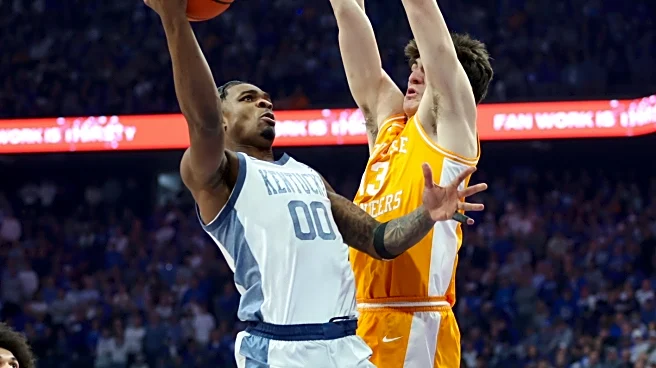What is the story about?
What's Happening?
Gen Z is reshaping brand equity through cultural fluency and emotional resonance, as identified by the Ad Age–Harris Poll quarterly ranking. Brands that are gaining traction with Gen Z are those that embody creativity, social consciousness, and humor. Poppi, Stanley, and Olipop are among the brands that have successfully captured Gen Z's attention by blending wellness, aesthetic, and nostalgia with functionality. These brands are thriving by adapting authentically to Gen Z's preferences for transparency, participation, and community storytelling. The trend highlights the importance of consistent engagement over traditional advertising spend, with Gen Z's attention serving as a key indicator of brand vitality.
Why It's Important?
The influence of Gen Z on brand popularity is significant as it shapes global culture through social media virality and values-based consumption. Brands that align with Gen Z's preferences for authenticity, humor, and inclusivity are thriving, while those that fail to adapt risk losing relevance. This generational shift in influence is redefining how brands communicate and earn trust, emphasizing the need for agility and cultural awareness. The trend underscores the importance of brands acting human rather than corporate, as Gen Z rewards transparency and community engagement. This shift has implications for industries across the board, as brands must navigate the new landscape of cultural currency and emotional equity.
What's Next?
Brands that wish to succeed with Gen Z must continue to adapt and innovate in real-time, embracing humor, transparency, and inclusivity. The trend suggests a rise in member-driven ecosystems, hyper-personalized storytelling, and AI-powered authenticity. Collaborations between values-aligned brands are expected to replace traditional celebrity endorsements, emphasizing the importance of purpose-driven partnerships. As Gen Z continues to redefine brand engagement, companies must prioritize co-creation and community-led growth to maintain relevance and build emotional equity.
Beyond the Headlines
The trend highlights the democratization of branding, where creativity is redistributed and brands collaborate with their audience to lead the future of marketing. Gen Z's demand for authenticity and transparency is reshaping consumer behavior, with co-creation replacing passive consumption. The emphasis on humor and ethics in brand communication reflects a broader cultural shift towards relatability and belonging. This era of co-created culture challenges traditional power dynamics, requiring brands to listen, adapt, and engage with their audience in meaningful ways.
















